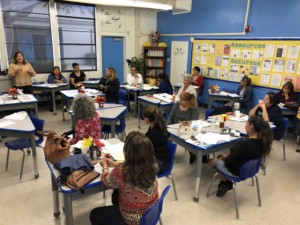Florida Parent Leader Urges Online Ed Policy Reform
Parent leader urges Florida to reform online education policies
TAMPA, Fla., Dec. 3, 2010 /PRNewswire-USNewswire/ — Highlighting a new national report on digital learning, a Florida parent leader today called on state policymakers to act now to increase access to online learning options and to remove all barriers preventing families from choosing online schools, or risk falling behind other states.
A report released this week by Digital Learning Now (DLN), an independent, bipartisan group co-chaired by former Governors Jeb Bush (R-FL) and Bob Wise (D-WV), called for states to adopt “10 Elements of High Quality Digital Learning” – a set of policy goals to ensure all students have access to multiple high quality online learning opportunities.
Among the DLN’s recommendations is for states to remove restrictions on enrollment in online schools, increase the number of online learning options, and enable students to choose from multiple online schools and course providers.
Wendy Howard, Chair of the Florida Chapter of the National Coalition for Public School Options highlighted three areas in which Florida has fallen short of the report’s goals.
First, Florida prohibits students who were not enrolled in a public school the prior year from enrolling in their school district’s virtual public school, regardless of their educational need. The DLN report declares that “students who are eligible for public school should be eligible for publicly funded digital learning,” and urges states to “ensure access to high quality digital content and online courses to students in K-12 at any time in their academic career.”
Second, Florida law does not permit students to receive an education from an online school program outside of their resident district. The DLN report specifically addresses such geographic restrictions in the virtual public school context as “illogical,” and recommends states “not restrict access to high quality digital content and online course based on geography, such as school district, county, or state.”
Finally, Florida law does not allow access to multiple high quality online course providers, nor does it allow for other proven digital learning options, such as virtual charter schools – a model that is thriving in over 20 states. Parents and students in Florida do not have freedom to choose the online public school or course provider. Children can only attend the online program sponsored by their resident district, and the state does not give families choice or access to multiple course providers through its state-run program. The DLN report urges states to give all students “access to multiple high quality providers… including public, private and nonprofit.”
Howard said, “Here in Florida we have been traditionally viewed as a leader in online education, but there are just too many barriers to access and lack of options for families for that to be true. Sadly, unless changes are made Florida will continue to lag and risks falling further behind many other states.”
According to the 2010 Keeping Pace with K-12 Online Learning Report, Florida ranks near the bottom when compared to other states with multi-district full time online schools, with only 2,400 student enrollments. Comparatively, Ohio, Pennsylvania, and many other states are far ahead of Florida (Ohio and Arizona lead with over 30,000 students enrolled in each state last year). The Keeping Pace Report also finds that even states with a much lower population than Florida, such as Idaho and Nevada, are outpacing the Sunshine State. This same report stated that Florida’s policy has created “confusion” and is “cumbersome, inefficient, and poorly understood within the state.”
Florida also trails several other states in online course enrollments. According to figures in the Keeping Pace report, last year Ohio had approximately 380,000 online course enrollments, Arizona had 364,000, and Pennsylvania had 295,000 (measuring states’ full time online school students at 12 course enrollments per year; not including district programs). By comparison, last year Florida had approximately 214,000 course enrollments through its state-run program and less than 29,000 in the district programs.
Howard continued, “The only reason Florida is not the true leader in digital learning are these outdated policies that block student access and deny parents options and choices. Florida was one of the first states to embrace online learning thanks to the work of many educators and the vision and leadership of reform-minded policymakers, including former Governor Jeb Bush. But today in Florida, the potential of digital learning is being held back by policies that do not make any sense anymore and only serve to frustrate many parents seeking access to online learning. So the time is now for Florida’s new leaders to step up, really unleash the potential of digital learning, and give students and families the online education opportunities they demand and deserve.”
The Florida Chapter of the National Coalition for Public School Options is organizing parents to ensure their voices are heard as Florida policymakers consider how to ensure public education options are accessible to every Florida family.
Review the full Digital Learning Now report





0 Comments
Leave a Comment
Your email address will not be published. All fields are required.